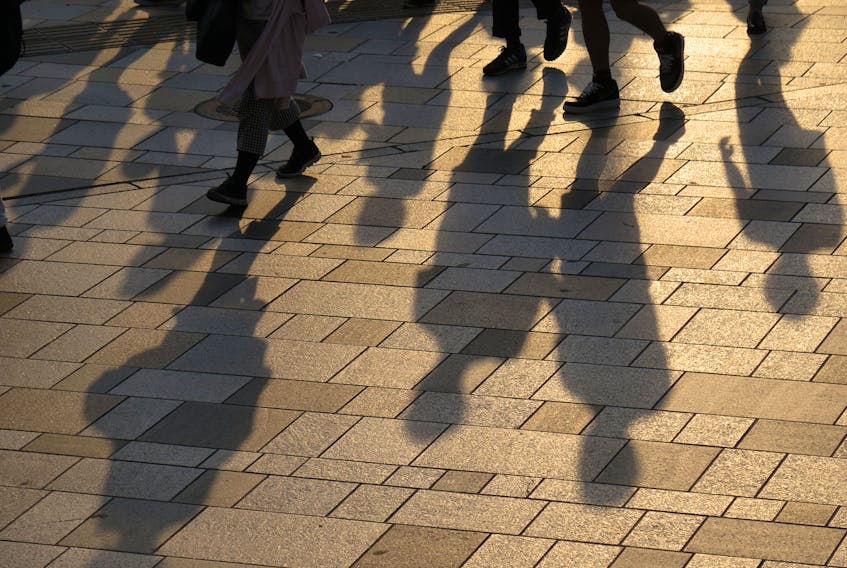The days are crushingly short now, the mornings dark when I leave for work, the evening light already folding in on itself when I leave work to walk home. It is, in its own way, the most introspective time for walking, outside of heading out on foot in a snowstorm.

For the last week or so, it’s been raining, and that closes things in even more: the hood of my raincoat in tight around my face, noises muffled, the edges of vision limited. This morning, I was passed by a solo runner: I heard the light footsteps only an instant before the runner appeared at my right shoulder and she called “good morning” at me as if to try and diffuse the surprise of her appearing and passing me.
I get passed by, or meet, the early morning runners a lot. Sometimes it’s clots of the 6:30 a.m. team-shouters, filling the air with loud conversation so they can hear each other over the effort of running. Other times, pairs or trios trying to manage their combined pace so no one is left behind and no one is held back. Sometimes, near the end of their route, a stretched-out group over a whole block or so, with the last runner always wearing that strange mask of resignation.
But back to the morning: I realized as the runner passed me, her flashing orange armband the last thing to vanish into the mist, that there’s a real difference between the solo male runners and the solo female runners. The men almost relish surprising you; nothing but their footfalls give you any warning, as though they’re happy to see you startle and jump. Bang, and they’re there, often close enough beside you to make you move sideways.
Women runners, however, are always two-way aware. They almost always give you some kind of warning as they approach you from the back, and they are far more likely to spot you from a distance, mark your path, and change theirs to loop away on a dogleg, crossing the street or taking a turn. (When I used to run, I always took the shortest line to getting done, and there was little except an angry dog on the end of a chain that would make me shift even the slightest bit in any direction. And that makes me wonder: am I an angry dog?)
I think sometimes, as I wander through the gloom, that it must be hard — not to mention counterproductive — to have to use so much time and effort to simply remain constantly situationally aware.
It’s the same when you meet other walkers in the half-light; men do react — they have a way of squaring up on their side of the sidewalk, and I can sometimes feel myself doing the same thing, in return. Shoulders coming up, hands positioned, returning direct eye contact if contact is made.
But lone women are different. Not everybody, of course, because there’s no universal to anything. But often, I take one edge of the sidewalk, they take the far other, and their phones are up to their faces and lit as though to convince you that, even before dawn, they aren’t really alone at all, that there are essentially a pair of people passing you on the other edge of the sidewalk.
The body language is so very different from that of men, and I think sometimes, as I wander through the gloom, that it must be hard — not to mention counterproductive — to have to use so much time and effort to simply remain constantly situationally aware.
I sometimes get to work and don’t even remember what has occupied my mind on the way there; sometimes, I’m filled with a grab bag of things like why my brain could have thought for a moment that a dry leaf, skittering along on its tips, was actually a crab. I might wonder, as I did last week in the rain, how what was obviously a small trout wound up in the gutter on a city street. Sometimes, a verse of the same song cycles around — sometimes, I count, for no real reason, stopping arbitrarily at 300 steps or so.
It washes my mind clean. I don’t know what I’d do without it.
I spent years caught in a feedback loop of preplanning disasters large and small, and how to react to them, the unexpected fallout of working as a firefighter. I know that constant focus on the danger in every detail is exhausting. I hate that anyone has to live that way, especially while doing something as simple as morning exercise. There has to be a better way.
Russell Wangersky’s column appears in SaltWire publications across Atlantic Canada. He can be reached at [email protected] — Twitter: @wangersky
MORE FROM RUSSELL WANGERSKY
• A poor prescription for a pressing problem








